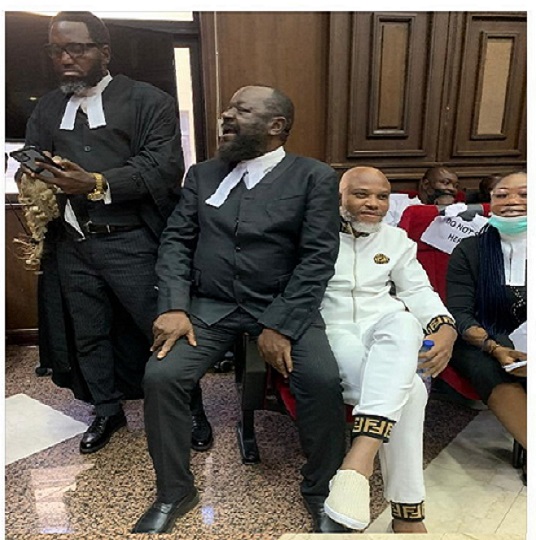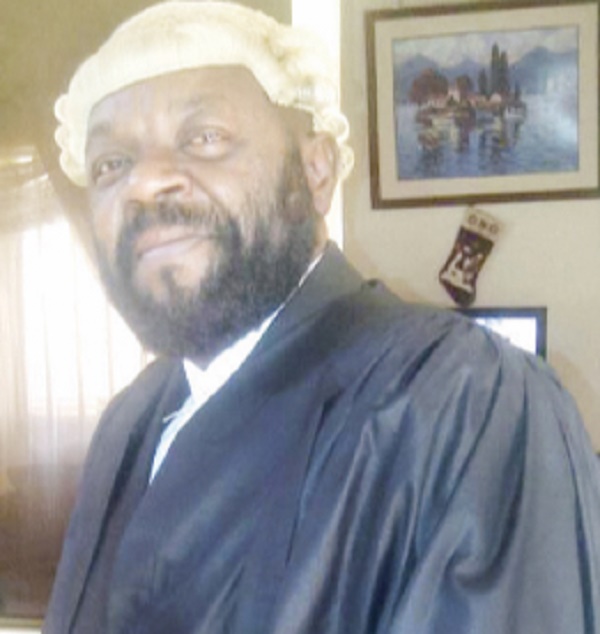The first mishandling was back in 2015, when the needless arrest of Nnamdi Kanu transformed IPOB to a burgeoning mass movement and made him a folk hero and the alpha male of the overt and covert resistance to the institutional political injustices that persist in Nigeria.
By Aloy Ejimakor

Following the extraordinary rendition of Nnamdi Kanu last year, John Campbell, a former US Ambassador to Nigeria (quoting a journal article published in Council of Foreign Relations) cautioned in a tweet that Nigeria cannot afford any more ‘mishandlings’ of the matter of Nnamdi Kanu, positing that “the safety and security of the country depends on it”.
Recently, on two different occasions when the question or request of releasing Kanu was put to President Buhari, he parried the matter by ruling out the prospects of any executive decision on it, stating instead that it is a decision that he has left to the courts. In other words, Buhari twice promised to comply with any court order that bears on releasing Kanu from detention. At the time, ardent admirers of the President had applauded him for demonstrating a proclivity for ‘respecting’ the judiciary. On my part, I had tweeted that a day shall come when the President shall be held to that promise. That day has come.
In the wake of the Court of Appeal judgment last Thursday discharging Kanu from all the charges pending against him, I recalled both Ambassador Campbel’s diplomatic cautions and Buhari’s presidential promises and suddenly realized that the ‘mishandlings’ Campbell had alluded to are somewhat legion.
The first mishandling was back in 2015, when the needless arrest of Nnamdi Kanu transformed IPOB to a burgeoning mass movement and made Kanu a folk hero and the alpha male of the overt and covert resistance to the institutional political injustices that persist in Nigeria. Despite widespread outcries, the government of Nigeria persisted with the trial of Kanu which, in quick time, unwittingly turned out to be greatest membership drive for IPOB and the major factor that validated its demand for self determination.
The second mishandling and of the deadly kind were the series of contrived clashes with IPOB from August 2015 to September 2017 when the security forces lethally invaded Kanu’s home in Umuahia. In between, many lives were extrajudicially lost over an agitation that is, by law, a legitimate political opinion that requires political brinkmanship, rather than violence, to resolve. But of a more significant impact is that Ndigbo, not just IPOB, felt collectively wounded and bereaved by the questionable extrajudicial killings of Igbo youths that seemed to have become the norm.
The third mishandling quickly followed on the heels of the second when, in a fit of egregious discrimination, the IPOB was proscribed and designated a terrorist group in the midst of the open and brazen pampering of the real and notorious terrorists that have overrun Northern Nigeria and breaching the boundaries and inner reaches of Southern Nigeria. Nigerians of conscience and the international community were aghast to the point that some important foreign powers, such as Britain and America, spoke out against the terrorist designation.
READ ALSO: I can prostrate before Buhari to get Nnamdi Kanu released — Ezeife
The fourth mishandling was in March 2018, when I secured a sound decision from an international human rights tribunal, directing President Buhari to cease and desist from any further law enforcement actions against the IPOB and Nnamdi Kanu. The tribunal took it a notch further by writing an impassioned letter to Buhari, stressing the need for immediate compliance, especially as Nigeria is a prime State party to the Instrument that grandfathered and founded the tribunal. Shockingly, the President ignored the tribunal and even added insult to injury by escalating the lethal law enforcement tactics the tribunal had sought to halt.
The fourth and the most infamous mishandling is the extraordinary rendition of Kanu. Initially, the government pretended to have legally extradited Kanu and much of the public thought so until I called it ‘extraordinary rendition’ in my first public statement on the matter in early July 2021. And for this reason, I was detained and interrogated. I was also subjected to sponsored social media attacks and vicious blackmail which heightened to threats to my physical safety when I unilaterally took the matter of the rendition to the State and Federal High Courts in Umuahia. It was a lonely and difficult journey that, to my eternal relief, finally found companionship and validation in the Court of Appeal.
The fifth mishandling was persisting with the detention of Nnamdi Kanu on the premise that he had jumped bail, even after I secured a damning judgment to the contrary from the High Court of Abia State. A well-ordered society, predicated on good conscience, equity and rule of law would have pivoted on this judgment to restore Kanu to his bail or even call a mistrial. At that juncture, the task of rendering justice to Kanu and letting him go home was the prerogative of the trial court but it did not happen.
The sixth mishandling was the refusal to comply with the directives to release Kanu unconditionally which issued from the United Nations Human Rights Council (the Working Group on Arbitrary Detention) in July this year. Bruce Fein, my erudite colleague based in the United States worked very hard to secure this decision while I supplied him all the facts and litigation support he needed from Nnamdi Kanu because he was not allowed to meet with Kanu during his odd four visits to Nigeria for this purpose. It was tough. Bruce, a former associate Deputy Attorney-General of the United States is a lawyer of international renown. So, you can imagine the incalculable diplomatic consequences of preventing him from meeting with his client that many times. The treatment meted out to Bruce discouraged the other Nnamdi Kanu’s lawyers I closely work with – the Bindmans of Britain and the Luchiri of Kenya – from coming to Nigeria to meet with Kanu.
The seventh mishandling is three-pronged and they are: the Attorney-General’s pathetic semantic games with the language of the judgment (discharged versus acquitted), his unbelievable misconception of pre-rendition and post-rendition offenses and the extrajudicial intermeddling of the National Security Council with the fruits of the judgment. My summary take on these are as follows:
One, whether acquitted or not, discharged is enough to allow Kanu to go home. In our jurisprudence, it is not an acquittal alone that allows a detainee to go home. A discharge or even a strike out can as well. The reason for this is constitutional and that is: The government is not allowed to lock you up without a criminal charge standing against you. So, as of 6pm on Thursday when the gavel came down at the Court of Appeal in favor of Kanu, he no longer had any criminal charges standing against him. Thus, continuing to detain him, other than for a short period required to administratively process his release, amounts to false and unlawful imprisonment, if not worse. To be sure, it is this same attitude that guided the actions which culminated in the extraordinary rendition that will, like that of Umaru Dikko, dog this nation for eternity.
Two, on the notion that Kanu will not be released because of what the AGF called pre-rendition offenses, the AGF appears to have forgotten that, in his fit of levying quantum terrorism offenses against Kanu, he unilaterally dropped all the pre-rendition offenses but the one dealing with illegal importation of radio equipment, which incidentally happened to be one of the seven counts dismissed by the Court of Appeal last Thursday. So, there is no single pre-rendition offense still pending against Kanu. None!
Three, the National Security Council has no business discussing whether a court order should be obeyed or not. It makes it look like the Supreme Court of Nigeria, which it is not. Plus, the agitation for Biafra is a protected political opinion called self determination in both our domestic laws and international law. It is not a national security issue that requires guns, bullets rendition and imprisonment. Instead, it calls for dialogue, political brinkmanship, accord and satisfaction.
The eight and final mishandling (or final straw, if you like) lies in President Buhari failing to keep to the promise he had twice made to obey any court order that bears on the release of Nnamdi Kanu. Any man or woman of honour and integrity close to the President should call him aside from those misleading him and then advise him that such solemn promise is supposed to be kept because a promise, especially of the presidential kind, is a debt guaranteed by the personal honour and the full faith and credit of the President of the Federal Republic of Nigeria.
- Aloy Ejimakor is the Special Counsel to Kanu/IPOB




